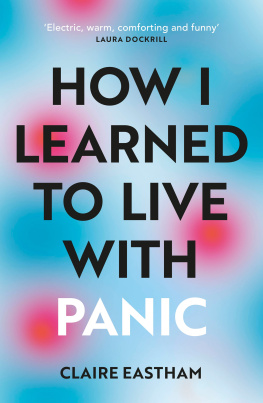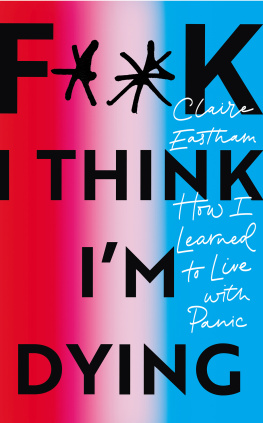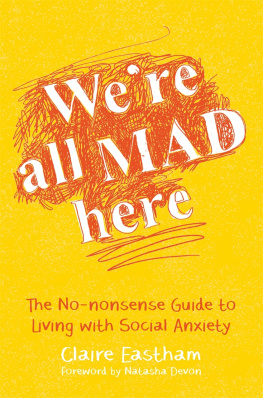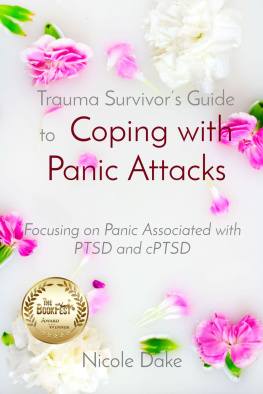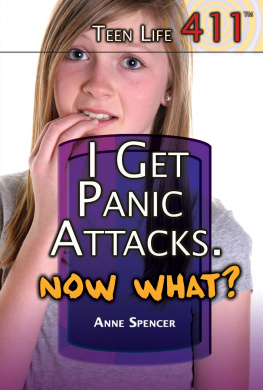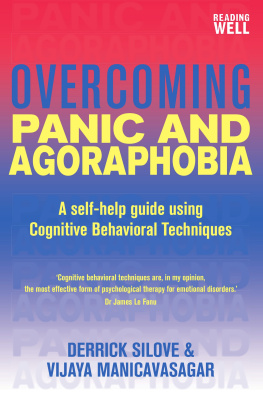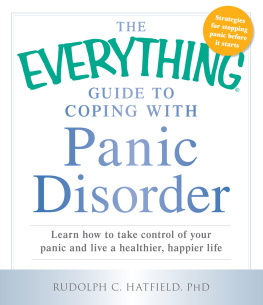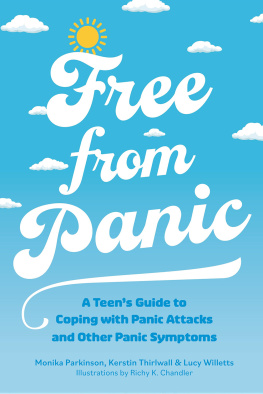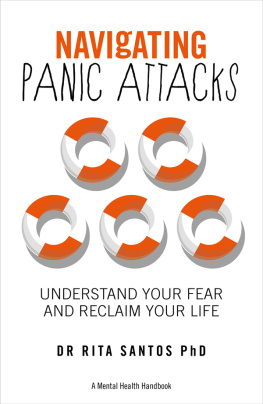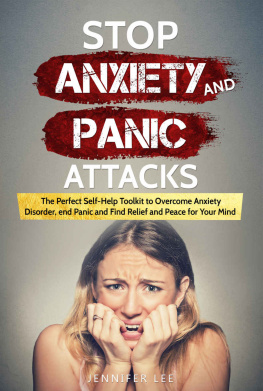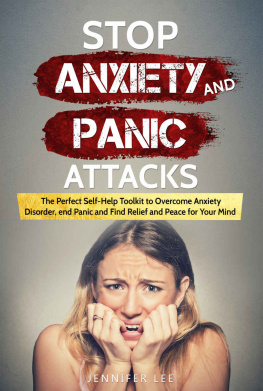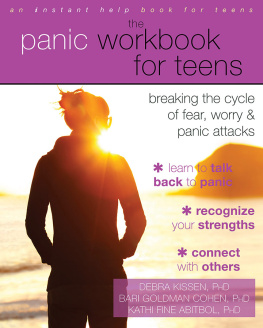Claire Eastham
HOW I LEARNED TO LIVE WITH PANIC

ALSO BY CLAIRE EASTHAM
Were All Mad Here: The No-Nonsense Guide to Living with Social Anxiety
VINTAGE
UK | USA | Canada | Ireland | Australia
New Zealand | India | South Africa
Vintage is part of the Penguin Random House group of companies whose addresses can be found at global.penguinrandomhouse.com.

First published in Vintage in 2022
First published under the title F**k, I Think Im Dying in trade paperback by Square Peg in 2021
Copyright Claire Eastham 2021
The moral right of the author has been asserted
Cover design Etta Voorsanger-Brill
Every effort has been made to ensure that the information contained in this book is correct, but it should not in any way be substituted for medical advice. Readers should always consult a qualified medical practitioner before adopting any complementary or alternative therapies.
Neither the author nor the publisher takes responsibility for any consequences of any decision made as a result of the information contained in this book.
ISBN: 978-1-529-19635-1
This ebook is copyright material and must not be copied, reproduced, transferred, distributed, leased, licensed or publicly performed or used in any way except as specifically permitted in writing by the publishers, as allowed under the terms and conditions under which it was purchased or as strictly permitted by applicable copyright law. Any unauthorized distribution or use of this text may be a direct infringement of the authors and publishers rights and those responsible may be liable in law accordingly.
Preface: The New Normal
This book was originally scheduled for publication in October 2020 but then the world went up in flames and plans were altered.
On 23 March 2020, the UK went into lockdown for the first time, something that feels like a lifetime ago to me now. Like everyone else, I watched Boris Johnson address the nation (you know youre fucked when its a special announcement from the BBC). He told us; from this evening I must give the British people a very simple instruction you must stay at home, and that was that. (Although we later found out that there were indeed a few loopholes for Tory MPs.)
Its not that I didnt really take it in beforehand the seriousness of the pandemic, I mean. I had, after all, heard the stats and read about the strain on hospitals, the plight of care homes and lack of available medical assistance. Id witnessed the queues outside of the supermarkets, the panic to buy milk and bog roll. (I said I wouldnt, then caved and bought a pack of twenty-four!) I knew that my parents were stuck in Germany and my brother in Canada, and that I had two elderly grandparents who I needed to make sure had food (one, who youll meet in chapter seven, only accepted the seriousness of the situation when the bingo closed).
On one of our daily fifteen-minute walks for exercise, my husband and I passed number 36 on our street and saw grandchildren holding up drawings to the window, chatting animatedly to their grandparents inside. As the weeks went on the yearning and confusion became a wound to children everywhere, who didnt understand why they couldnt embrace Nana or Grandad. Alas, these were not the things that shocked me; they were drip-fed slowly over time, as the world imploded.
What did shock me, however, was the rapid and in some cases dramatic decline in the mental health of people I knew and cared for. As a veteran of panic and anxiety, Im aware of the early signs, the symptoms (both mental and physical) and how to manage them. For the first time, I experienced panic and anxiety as an observer. I saw it in the eyes of the people I loved, heard it in their voices and observed it in their bodies. Whats happening to me? One friend cried, somethings wrong, but I dont know what.
From experience, I understand that confusion can be just as powerful as fear. Not understanding what is happening to you is a very frightening thing indeed. (Also, Id be lying if I said I didnt use the opportunity to point out; see, I told you panic was fucking terrifying!) I realised how ill-equipped people were at dealing with mental anguish when it struck. I dont mean this as a criticism, as it made sense on a fundamental level. Mental wellbeing was not prioritised by people of my generation and older. This cemented my belief that mental health education should be paramount in the workplace and not merely dependent on those lunchtime mental wellbeing presentations organised by HR maybe once a year and lets be honest, 50 per cent of us go for the free lunch!
During the first lockdown I received maybe fifty direct messages on both Instagram and Twitter, from people asking for advice. By the end of the second lockdown, it was 400. Kindness became the greatest, and in many cases only, available therapy.
I hoped then and continue to hope that this book will provide comfort for those experiencing panic; that it will ground the reader in the realisation that although overwhelming, panic attacks can be both understood and managed.
The COVID-19 pandemic has battered all of us over the course of two years, whether in large, violent ways, or death by a thousand papercuts. Approaching 2022, Im hopeful that we can gradually begin to heal, or at the very least have a two-week holiday in the sun!
Introduction
Allow me to be frank from the first sentence.
My name is Claire Eastham and I have, to date, experienced 371 panic attacks over a seven-year period. An average of fifty-three per year. I live with panic. Panic is in my veins and we cohabit; were roommates, lovers, enemies and all the rest. There are times when I notice it more, poking me, taunting me, knocking me off course, and times when I barely register its existence at all.
I understand the psychology of a panic attack, the purpose of one, the symptoms (physical, mental and emotional), the drugs used to sedate them and the therapy devised to find the root causes. I know it all, truly. Ive been writing about mental health for nearly a decade, translating medical jargon and making coping techniques more accessible. I have an award-winning blog, Im an ambassador for a national charity, and my first book Were All Mad Here sold out its entire first print run in just four days. This, along with personal experience and obsessive research, makes me an expert. Self-made, I might add. I cant follow up this claim with a medical qualification, but Im an expert all the same.
There is no cure for panic attacks. No magic wand I can wave, or snake oil I could flog. This is not a self-help book. A self-help book implies that a cure lies hidden somewhere within the contents. I have no method to share or solution to sell. But dont lose heart just yet, because what I do have to impart is experience, and I pledge that with a little work and understanding, panic attacks do not have to control you. They wont stop you from working, socialising or living a fulfilling life. We can remove their power.
There might not be an officially recognised cure, but what we can do is learn how to communicate with panic. We can learn what triggers our attacks, how to stop the attacks from being triggered in error and how to deal with them when they are triggered.
I learned how to communicate with panic the long and hard way, through a variety of experiences and complete fuck-ups. Not that Id change anything. Fuck-ups are how Ive learned the majority of lifes lessons. Im not saying this as an affirmation, or even to be used as inspiration. Its a fact: mistakes make for a superior teacher.

